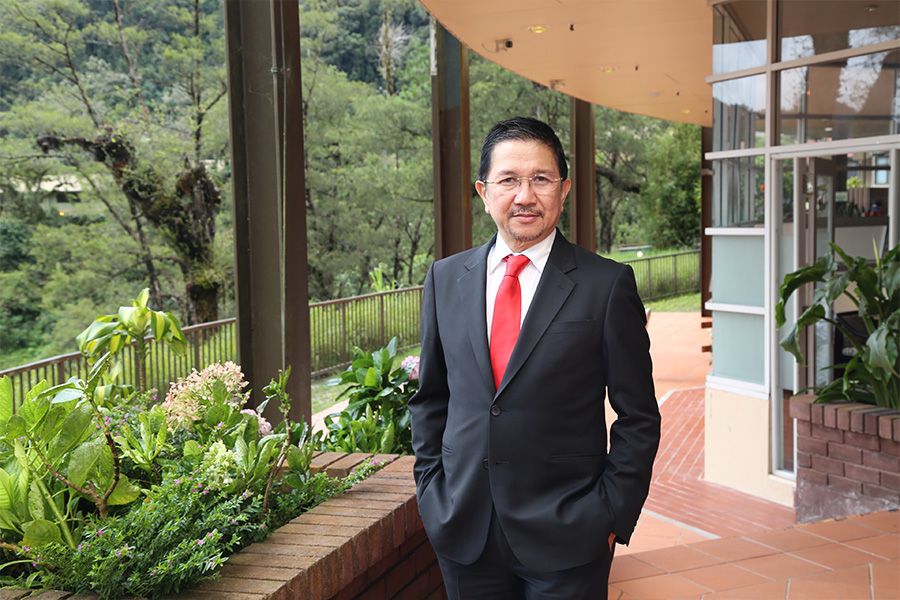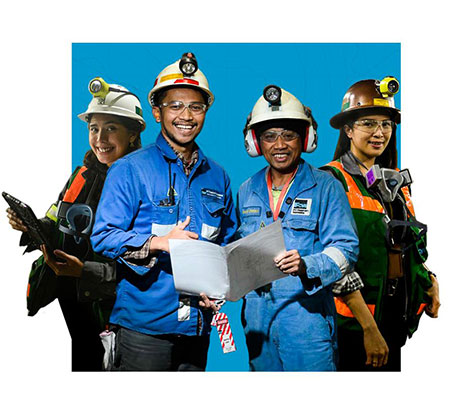13 May 2022

Tony Wenas' experience at the top of the leadership of large companies has been going on for a long time. Prior to being appointed as President Director of PT Freeport Indonesia (PTFI) in December 2018, he was Executive Vice President & Director of PTFI. The man who was born in 1962 has also been the number one person at PT Riau Andalan Pulp and Paper, PT Berkat Resources Indonesia, and PT Vale Indonesia Tbk.
In leading the company, Tony analogizes himself as a conductor in an orchestra who pays attention and manages his musicians to create a harmony. “I may not be a financial expert, not a mining expert, not a logistics expert, but I have to be able to combine all these elements into a single unit so that the company's goals can be achieved. It's all about managing people," said Tony, who is also active as a professional musician.
The predicament of the pandemic has been perhaps the most distinct challenge of his career as a leader. Nevertheless, he still able to maintain the performance of PTFI. In the midst of the pandemic situation, this mining company, which is 51% of its shares controlled by the Indonesian government, was able to achieve its 2021 production target of 1.3 billion pounds of copper and 1.3 million ounces of gold.
This achievement is certainly not easy, considering that the price of copper had fallen at the beginning of the pandemic to a position of US$ 2.15 per pound, and extra efforts are still needed to prevent the transmission of Covid-19 so that operations in mining areas are maintained.
So, what did he do so that he could maintain the company's performance?
Tony explained that unlike a number of other industries, which could adjust production figures or diversify products in the middle of the road as a temporary solution, the mining industry could not do it because the mining pattern had to be carried out according to the plans that had been made. “The main plan cannot be changed. What can be adjusted is the handling, such as work patterns, the number of people working on the spot, and the transportation system," he said.
So, the steps he took at that time was to anticipate all the risks that might occur. Not only from a financial perspective, but also from a health perspective. For handling Covid-19, he isolated Tembagapura City to prevent the spread of the corona virus in the project area, established a task force team, and increased the number of medical teams and PCR test kits.
Admittedly, that situation was not easy. Tembagapura is inhabited by around 20 thousand people and is a residential area for PTFI operators, which number no less than 15 thousand people. Adjusting the work schedule is also a challenge. Tony said the isolation was carried out for more than four months.
As soon as Tembagapura could be reopened, he immediately flew to the location to meet the employees there. For him, a leader must be present in any situation. “Being there with them is very important. Even in a normal situation is important, let alone in difficult situations," he said.
Meanwhile, at the Jakarta office, a work from home (WFH) method is applied. In fact, the current regulation for WFH employees of more than 50% has been made permanent because it is proven to provide efficiency and productivity that is maintained.
At PTFI, Tony leads 28 thousand employees. He heads 40 vice presidents and hundreds of managers. Luckily, he and his team have been used to conducting online video conferences for coordination since before the pandemic. The difference is, during the pandemic, communication is more intensified, both online and offline.
Coordination is also carried out at the stakeholder level, such as Freeport-McMoran and MIND ID. “Horizontal coordination with the team, at least once every month I go to the Tembagapura jobsite. Communication via Zoom is also carried out almost every day, both internally and externally with stakeholders," he said.
Tony is optimistic about the copper business climate in 2022. Internally, PTFI is at a production level that will reach 100%, considering the underground mine ramp-up will reach its peak. PTFI itself uses advanced technology.
The Grasberg Block Cave (GBV) underground mining activities are mostly carried out robotically. Since 2006, they have also utilized Minegem's remote control technology, which allows operators to pick up ore from a distance of approximately six km. The latest one is an unmanned electric train consisting of 11 tub carriages capable of transporting 300 metric tons of ore one way.
Then, externally, demand for copper is still high, because significant improvements have been seen in the world economy, and the projection for the Indonesian economy to grow is very good. “The industry (also) continues to emerge. Among other things, electric cars. Electric cars require four times as much copper as regular cars. Likewise renewable energy. So, the demand is high because there is growth," he said.
As a result, after two tough years, Tony looks to 2022 with full of optimism. “We are targeting production in 2022 of 1.6 billion pounds of copper and 1.6 million ounces of gold. This is going to be one of our best years. We are very optimistic. With team discipline, maintaining work safety, and maintaining health, we believe this target can be achieved." (*)
Kami menghimbau para pencari kerja untuk berhati-hati dan mewaspadai beragam modus penipuan perekrutan yang mengatasnamakan PT Freeport Indonesia. Dalam setiap proses rekrutmen dan penerimaan karyawan, PT Freeport Indonesia maupun konsultan rekruitmennya tidak memungut biaya apapun.
Untuk melihat lowongan, silakan akses melalui link berikut: ptfi e-recruitment
Untuk melihat informasi magang, silakan akses melalui link berikut: Internship Program
